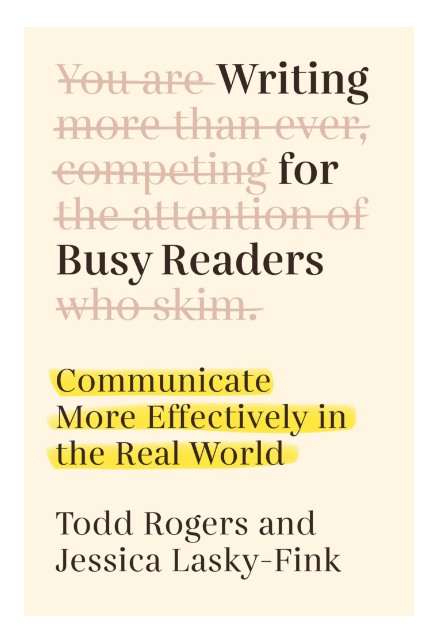Is Your Writing Edited?
Nancy Gibbs, former editor in chief of Time magazine, often quipped, “every word has to earn its place in a sentence, every sentence has to earn its place in a paragraph, and every idea has to earn its place in a text.”
And it turns out we’re not very good at deleting when we edit. One study asked participants to edit their own summary of a short article they were provided. Eighty-three percent added words.
If you think your reader – colleague, donor, client – is busy then you owe it to yourself and them to make it shorter. Another study (from authors with a very creative book cover shown below) sent two survey invitation emails; one was 127 words, the other 49. The latter got a 78% higher response rate.
Why is that? The people who got the longer email incorrectly assumed the survey would be longer.
A lot of lengthy writing doesn’t get rea d at all because we rightly assume it will take more time while discounting the possible positives – e.g., we learn more, we feel more connected. And even if the lengthier tomes get started, people often bail.
d at all because we rightly assume it will take more time while discounting the possible positives – e.g., we learn more, we feel more connected. And even if the lengthier tomes get started, people often bail.
This isn’t a recommendation to write shorter, just better.
And follow Nancy’s advice, make every word, sentence and paragraph earn it. And know that your bias is probably longer and to fight against that.
Short, medium or long copy is never a (good) goal. Getting and keeping the reader’s attention is what matters.
Kevin



Nice, nice, nice: “Keeping the reader’s attention is what matters.”
How many adjectives can I barnacle on your incisive article, Kevin? “Concise.” (Though 2 syllables. Maybe instead…) “Short.” Guess that doesn’t quite capture much of anything either, unless you know some of the back-story of why shorter messaging penetrates MOST deeply, in mass communications (ref. Schwab, Schwartz, Joseph Sugarman; et al.)
Hi Tom, good to hear from you as always. And as always, you’ve got a handle on the power and nuance of words, love your short vs. concise example. The latter has positive valence while the former is highly dependent on context and otherwise begs the question of good or bad.